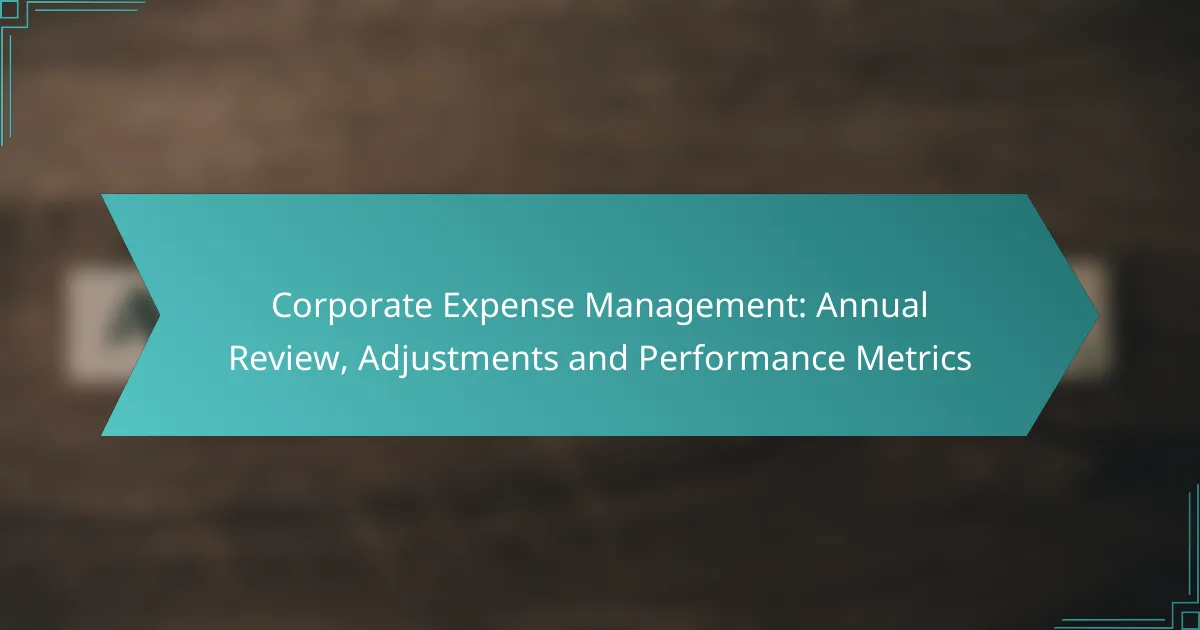Effective corporate expense management is crucial for aligning financial goals with business objectives. By implementing automated systems, establishing clear policies, and utilizing specialized software, organizations can enhance visibility and control over their spending. This strategic approach not only supports profitability but also drives operational efficiency, ensuring that every dollar spent contributes to the company’s overall success.

What are the best practices for corporate expense management?
Best practices for corporate expense management include implementing automated systems, establishing clear policies, conducting regular audits, and utilizing specialized software. These strategies help organizations align their financial goals with business objectives, ensuring efficient tracking and control of expenses.
Implementing automated expense tracking
Automated expense tracking simplifies the process of monitoring and managing company expenditures. By using technology, businesses can reduce manual entry errors and save time, allowing employees to focus on core tasks. Consider integrating tools that capture receipts and categorize expenses automatically.
For effective implementation, ensure that the chosen system can integrate with existing financial software. This will streamline data flow and enhance reporting capabilities, leading to better financial insights.
Establishing clear expense policies
Clear expense policies set expectations for employees regarding what constitutes acceptable spending. These guidelines should cover travel, meals, and other business-related expenses, specifying limits and approval processes. Well-defined policies help prevent overspending and ensure compliance with company standards.
Regularly review and update these policies to reflect changes in business needs or economic conditions. Providing training sessions can also help employees understand and adhere to the policies effectively.
Regular financial audits
Conducting regular financial audits is essential for maintaining oversight of corporate expenses. Audits help identify discrepancies, ensure compliance with policies, and uncover potential areas for cost savings. Aim for audits at least annually, or more frequently if your organization has high transaction volumes.
Utilize both internal and external auditors to gain different perspectives on financial practices. This dual approach can enhance accountability and foster a culture of transparency within the organization.
Utilizing expense management software
Expense management software centralizes the tracking and reporting of expenses, making it easier to analyze spending patterns. Look for features such as real-time reporting, mobile access, and integration with accounting systems. This software can significantly reduce administrative burdens and improve accuracy in financial reporting.
When selecting software, consider the scalability of the solution to accommodate future growth. Many options offer tiered pricing based on the number of users or features, allowing businesses to choose a solution that fits their budget and needs.

How can expense management align with financial goals?
Expense management can effectively align with financial goals by ensuring that spending is tracked and controlled in a way that supports the overall objectives of the business. By establishing clear financial targets and monitoring expenses against these benchmarks, companies can enhance profitability and operational efficiency.
Setting measurable financial KPIs
To align expense management with financial goals, organizations should establish measurable financial Key Performance Indicators (KPIs). These KPIs can include metrics such as expense-to-revenue ratios, budget variance percentages, and cost per acquisition. By regularly reviewing these indicators, businesses can assess whether their spending aligns with their financial objectives.
For example, a company might set a target to keep its expense-to-revenue ratio below 30%. Tracking this KPI allows the organization to make informed decisions about where to cut costs or invest more resources. Regularly updating these KPIs ensures they remain relevant to changing business conditions.
Integrating budgeting with expense tracking
Integrating budgeting with expense tracking is crucial for effective expense management. This integration allows businesses to compare actual spending against budgeted amounts in real time, facilitating quicker adjustments to financial strategies. Companies should use software tools that provide visibility into both budgets and expenditures.
A practical approach is to create monthly budgets and track expenses weekly. This method helps identify any discrepancies early, allowing for timely corrective actions. Additionally, businesses should avoid common pitfalls, such as underestimating expenses or failing to update budgets based on actual spending trends.

What tools enhance corporate expense management?
Several tools can significantly improve corporate expense management by streamlining processes, enhancing visibility, and ensuring compliance. These solutions often integrate with existing financial systems, making it easier to track and control spending across the organization.
Expensify for receipt management
Expensify simplifies receipt management by allowing users to scan receipts and automatically generate expense reports. This tool uses OCR (Optical Character Recognition) technology to extract data from receipts, reducing manual entry and errors.
With features like SmartScan and automatic categorization, users can quickly organize their expenses. Expensify also offers integration with various accounting software, making it easier to sync data and maintain accurate financial records.
Concur for travel and expense integration
Concur is a comprehensive solution that integrates travel booking and expense reporting into one platform. This tool allows employees to book travel and automatically capture related expenses, streamlining the reimbursement process.
Concur’s robust reporting features provide insights into travel spending patterns, helping organizations identify cost-saving opportunities. Additionally, it supports compliance with company policies and regulatory requirements, ensuring that all expenses are properly documented.
Zoho Expense for small businesses
Zoho Expense is tailored for small businesses, offering an affordable and user-friendly expense management solution. It allows users to track expenses, manage approvals, and generate reports, all within a single platform.
This tool includes features like multi-currency support and integration with Zoho’s suite of applications, making it suitable for businesses operating in various regions. Zoho Expense also provides mobile access, enabling users to manage expenses on the go, which is essential for small teams with limited resources.

How to choose the right expense management software?
Choosing the right expense management software involves evaluating user-friendliness, integration capabilities, and pricing models to ensure it aligns with your financial goals and business objectives. A well-selected tool can streamline expense reporting, enhance compliance, and improve overall financial visibility.
Assessing user-friendliness
User-friendliness is crucial for ensuring that employees can easily adopt the expense management software. Look for intuitive interfaces, straightforward navigation, and clear instructions to minimize training time and increase compliance.
Consider conducting a trial or demo to gauge how easily your team can input expenses and generate reports. A software solution that requires minimal clicks and offers mobile access can significantly enhance user experience.
Evaluating integration capabilities
Integration capabilities determine how well the expense management software can work with your existing financial systems, such as accounting software or ERP solutions. Ensure that the software can seamlessly connect with tools you already use to avoid data silos and manual entry errors.
Check for compatibility with popular platforms like QuickBooks, SAP, or Xero. A solution that offers API access or pre-built integrations can save time and reduce the complexity of managing multiple systems.
Comparing pricing models
Pricing models for expense management software can vary widely, so it’s essential to compare options based on your budget and expected usage. Common models include subscription-based pricing, pay-per-user fees, or tiered pricing based on features.
Evaluate what features are included at each pricing level and consider any additional costs for integrations or support. Aim for a solution that provides good value for the features you need, and be wary of hidden fees that could inflate your total costs.

What are the common challenges in expense management?
Expense management often faces challenges such as ensuring employee compliance with policies and maintaining data accuracy to prevent fraud. Addressing these issues is crucial for aligning financial goals with business objectives.
Employee compliance with policies
Ensuring employee compliance with expense management policies is vital for maintaining budget control and preventing unauthorized spending. Companies should clearly communicate their policies and provide training to help employees understand the importance of adherence.
Regular audits can help identify non-compliance issues, allowing organizations to take corrective action. Implementing automated expense reporting tools can also streamline the process and reduce the likelihood of errors or policy violations.
Data accuracy and fraud prevention
Data accuracy is essential in expense management to ensure reliable financial reporting and effective fraud prevention. Organizations should implement robust data validation processes to minimize errors and discrepancies in expense reports.
Utilizing technology, such as expense management software with built-in fraud detection features, can significantly enhance data integrity. Regularly reviewing and reconciling expense reports against company policies can help identify suspicious activities and prevent financial losses.

How does corporate culture impact expense management?
Corporate culture significantly influences expense management by shaping employees’ attitudes toward spending and financial responsibility. A culture that prioritizes transparency and accountability can lead to more effective control over expenses and alignment with business objectives.
Encouraging transparency in spending
Encouraging transparency in spending involves creating an environment where employees feel comfortable discussing financial decisions openly. This can be achieved through regular meetings, shared financial reports, and accessible expense tracking tools. When employees understand the rationale behind spending, they are more likely to make informed decisions that align with corporate goals.
Implementing a clear expense policy that outlines acceptable spending practices can further enhance transparency. For example, companies might set limits on travel expenses or require pre-approval for significant purchases. This clarity helps employees navigate spending while ensuring alignment with the organization’s financial objectives.
Promoting accountability among employees
Promoting accountability among employees is crucial for effective expense management. When individuals are responsible for their spending, they tend to be more mindful of costs and the impact on the company’s bottom line. Establishing clear roles and responsibilities regarding budget management can foster this sense of ownership.
Regular performance reviews that include discussions about financial contributions can reinforce accountability. For instance, linking bonuses or incentives to budget adherence encourages employees to stay within their allocated spending. Additionally, providing training on financial literacy can empower employees to make better financial decisions that support the organization’s goals.

What are the regulatory considerations for expense management?
Regulatory considerations for expense management include compliance with financial regulations, tax laws, and industry standards. Organizations must ensure that their expense policies align with legal requirements to avoid penalties and maintain transparency.
Compliance with Financial Regulations
Compliance with financial regulations is crucial for effective expense management. Companies must adhere to laws such as the Sarbanes-Oxley Act in the U.S. or the International Financial Reporting Standards (IFRS) globally. These regulations require accurate record-keeping and reporting of expenses to ensure financial integrity.
To maintain compliance, organizations should implement robust internal controls and regularly audit their expense reports. This helps identify discrepancies and ensures that all expenses are justifiable and properly documented.
Tax Considerations
Tax considerations play a significant role in expense management. Businesses need to understand which expenses are tax-deductible and how to properly categorize them. For instance, travel expenses may be deductible if they are directly related to business activities.
It is advisable to consult with tax professionals to ensure compliance with local tax laws and regulations. Keeping detailed records of expenses can help in claiming deductions and avoiding potential audits.
Industry Standards
Adhering to industry standards is essential for effective expense management. Different industries may have specific guidelines regarding allowable expenses, reporting practices, and reimbursement processes. For example, the healthcare sector has strict regulations on travel and hospitality expenses.
Organizations should familiarize themselves with the standards relevant to their industry to ensure compliance. Regular training for employees on these standards can help mitigate risks associated with non-compliance.










